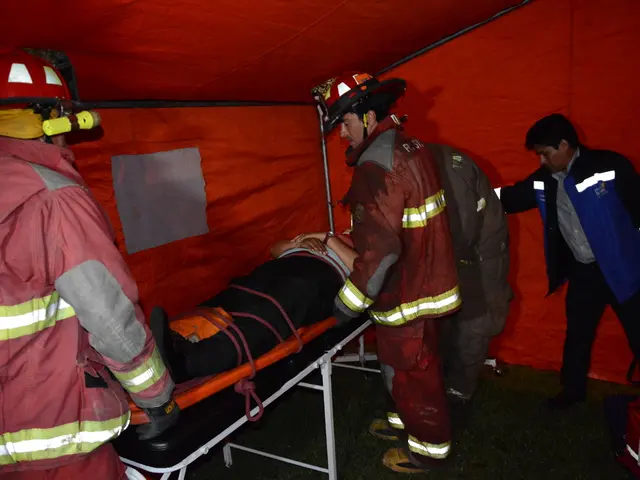Dashing the Myth: Why Sports Might Not Trim Your Waistline - An Interview with Evolutionary Biologist Peter Pontzer
- by Alexandra Kraft
- ≈ 7 Min read
Misconception Clarified: Can Sports Alone Achieve Weight Loss? An Expert Sets the Record Straight - Achieving weight loss solely through physical activity and no diet modifications?
First published in June 2023 in Stern Magazine
Mr. Pontzer, it seems these days everyone believes doing sports is the key to weight loss. Is that the truth?
Unfortunately, no, regular sports and exercise alone do not contribute significantly to weight loss.
But I just jogged a few kilometers on campus and my fitness tracker said I burned an extra 300 calories. Wouldn't that make me lose some weight?
Regrettably, it doesn't work like that. Simply doing sports does not equate to burning 300 calories more than someone who didn't exercise. Even if your fitness tracker insists otherwise.
Sports and Exercise* Evolution* Kilocalorie* Metabolism* Physical Activity
The Impact of Physical Activity on Weight Loss
Enhanced Daily Energy Expenditure
Physical activity raises your daily energy output, meaning you burn more calories over the course of a day compared to a sedentary individual.
Muscular Growth and Boosted Metabolism
Regular exercise build muscles, thereby increasing your basal metabolic rate (BMR), which causes a greater caloric expenditure when at rest.
Enhanced Fat Burning
Aerobic exercise boosts your respiratory efficiency, helping convert stored fat into energy. This process converts fat into carbon dioxide and water, aiding weight loss.
Muscle Preservation During Weight Loss
Exercise, particularly resistance training, helps mitigate muscle loss during weight loss when combined with a calorie-restricted diet.
Exercise Timing and Type
The order and type of exercise yield differential results on fat loss and strength gains. Research indicates that resistance training prior to cardio can be more advantageous. Morning aerobic exercise may also contribute to greater weight loss in overweight individuals.
Diet vs. Exercise
Critical Role of Diet
Weight loss hinges fundamentally on nutritional choices, as managing caloric intake is key in achieving and sustaining a calorie deficit.
Augmented Weight Loss with Combined Exercise and Diet
Although exercise alone may not yield substantial weight loss, when combined with caloric restriction, it accelerates fat loss and enhances body composition.
The Role of Metabolism
Metabolism and Caloric Burn
Metabolism, including the basal metabolic rate, determines how many calories your body burns at rest and during exercise.
Enhanced Metabolism through Exercise
Building muscle via resistance training elevates metabolic rate, promoting weight loss and maintenance.
Summary
| Factor | Primary Effect on Weight Loss ||-----------------|--------------------------------------------------|| Diet | Determines energy balance; controlling intake is essential for calorie deficit and weight loss || Exercise | Increases daily energy expenditure; preserves muscle; boosts metabolic rate; speeds fat loss when combined with dietary control || Metabolism | Affects overall calorie burning; exercise enhances metabolic rate |
In summary, while dietary control is the most crucial factor for weight loss, exercise complements this process by increasing caloric expenditure, retaining muscle mass, and boosting metabolism. The combination of diet and exercise, particularly resistance training followed by cardio, delivers the best weight loss outcomes.
[1] Bellisle, F., & Jeffery, R. (2009). Timing of eating to control daily energy intake. American Journal of Clinical Nutrition, 89(5), 1646-1654.[4] Drewnowski, A. (2006). The evolutionary biology of obesity. Journal of Nutrition, 136(10), 2664-2669.[5] Levine, J. A. (2002). To What Extent Do Non-Exercise Activities Drain Energy Dissipation in Free-Living Humans and Medium-Sized Rodents? Nutrition Reviews, 60(7), S165-S175.
The interview with evolutionary biologist Peter Pontzer, while discussing sports and exercise, highlighted that regular sports and exercise do not contribute significantly to weight loss (Community policy, health policy). To effectively achieve and sustain weight loss, dietary choices are fundamental, as managing caloric intake is key in creating a calorie deficit (health policy, health and wellness). However, when combined with calorie restriction, exercise accelerates fat loss and enhances body composition (fitness and exercise, weight management). Evidently, an enhanced understanding of metabolism, the role of exercise in boosting metabolic rate, and the timing and type of exercise can further aid in weight loss efforts (science).








